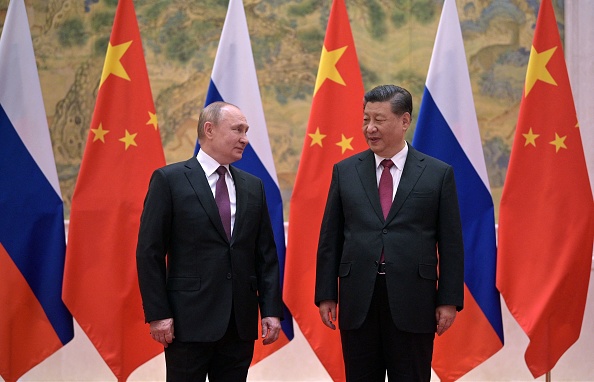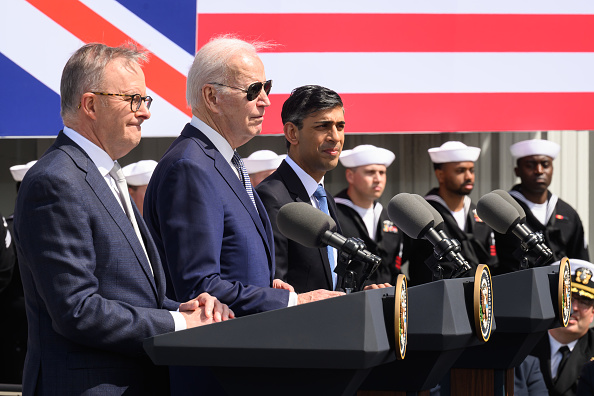
 Peacemaker Xi
Peacemaker XiA month after releasing a plan for ending the Russia-Ukraine conflict, Chinese President Xi Jinping is making more significant diplomatic moves to end the conflict. Next week, Xi is planning to visit Moscow to meet with Vladimir Putin and he will also hold a virtual meeting with Ukrainian President Volodymyr Zelenskiy.
China's previous 12-point plan for peace was quickly rejected by the European Union and the United States, whereas Russia praised it and Kiev said it was 'of interest.'
While Xi has spoken to Putin four times since Russia's invasion, the Chinese president has not yet spoken to Zelenskiy. With Beijing's increasing desire to play a more active role in mediating an end to the war, Xi may be stepping into new territory as a global power broker on sensitive diplomatic issues. This would follow closely on the heels of China's brokering of a diplomatic agreement between Iran and Saudi Arabia, two major rivals.
Washington has long been encouraging Xi to speak with Zelensky, and National Security Adviser Jake Sullivan praised the possibility of an upcoming meeting. Zelensky, too, has expressed interest in talking to Xi, one of the few major global players with whom he has not had a chance to have a conversation since the war began.
A visit by Xi to Russia would be a major diplomatic event for Putin. China and Russia struck a "no limits" partnership in February of 2022, weeks before Russia invaded Ukraine, and the two sides have repeatedly reaffirmed the strength of their ties in public.
Learn more in "The West Shouldn't Dismiss China's Peace Plan," a video interview with Michael Swaine, a Senior Research Fellow at the Quincy Institute for Responsible Statecraft.
 Seeking Security
Seeking SecurityChina has issued a stark warning about a major submarine deal between the United States, United Kingdom and Australia, which has been designed to counter China's military weight in the Indo-Pacific region.
President Biden, Australian Prime Minister Anthony Albanese and British Prime Minister Rishi Sunak jointly announced Australia's purchase of up to five conventionally armed, nuclear-powered U.S. submarines starting early in the 2030s. U.S. officials said it will create a "nuclear stewardship" among the allies.
"We're showing again how democracies can deliver our own security and prosperity, and not just for us but for the entire world," Biden added.
Alternatively, Chinese foreign ministry spokesman Wang Wenbin warned the leaders were heading down a "path of error and danger" after they unveiled the deal.. He also said that the statement disregards the concerns of the international community.
The submarine announcement is yet another diplomatic incident set against a backdrop of increasingly tense China-U.S. relations.
Read more in "U.S. Big Defense and Australia's Nuclear Crossroads," by Dan Steinbock, Founder of Difference Group.
 Unlocking Tourism
Unlocking TourismChina announced the reopening of its borders to foreign tourists for the first time since the COVID-19 pandemic began over three years ago, and comes after Chinese authorities declared a "decisive victory" over the virus last month. The move to resume visa issuance for tourists is part of Beijing's broader push to normalize two-way travel between China and the world, as it seeks to revive its domestic tourist industry and economy after another year of slow growth due to pandemic measures.
China announced that embassies have resumed issuing travel visas to foreigners as of March 15th, and foreign nationals holding visas issued before March 28, 2020, when the country's strict travel restrictions began, can enter if their visas are still valid. The foreign ministry also stated that areas in China that did not previously require visas will revert back to visa-free entry.
Although the notice did not specify the requirements for vaccination certificates or negative COVID-19 tests, Foreign Ministry spokesperson Wang Wenbin stated on Tuesday that China had improved measures for remote testing of people coming to China from relevant countries, allowing pre-boarding antigen testing instead of nucleic acid testing. "We also hope that all parties will join China in creating favorable conditions for cross-border exchanges," Wang Weibin concluded.
Despite this announcement, tourist industry insiders do not expect a large influx of visitors or a significant boost to the economy in the near future, partially due to increased travel costs, limited airfare access, and increasing geopolitical tensions between China and several western nations. That being said, business travel has rebounded sharply and is expected to fully recover next year.
In terms of outbound travel, China logged over 40 million entry-exit trips in two months after withdrawing its advisory to citizens against foreign travel in January. The China Outbound Tourism Research Institute has forecasted 110 million border crossings from mainland China in 2023, reaching two-thirds of the level of 2019, as China was the world's largest source of outbound tourists before the pandemic, contributing $253 billion to the global economy in 2019.
Prepared by China-US Focus editorial teams in Hong Kong and New York, this weekly newsletter offers you snap shots of latest trends and developments emerging from China every week, while adding a dose of historical perspective.
- 2023-03-10 Party Time
- 2023-03-03 “An Existential Struggle”
- 2023-02-24 Opposing Worldviews
- 2023-02-17 Ripple Effects
- 2023-02-10 Ballooning Tensions
- 2023-02-03 Hot Air
- 2023-01-27 Spheres of Influence
- 2023-01-20 China's Davos Pitch
- 2023-01-13 Strategic Encounters
- 2023-01-06 Common Challenges
- 2022-12-23
- 2022-12-16 All in On Africa
- 2022-12-09 Seeking Stabilization
- 2022-12-02 Turf Tension
- 2022-11-18 Thawing Ties?
- 2022-11-11 Face to Face
- 2022-11-04 The Pacing Challenge
- 2022-10-28 Third Time’s the Charm
- 2022-10-21 United as Steel